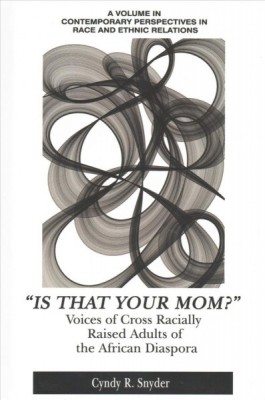| "Is That Your Mom?": Voices of Cross Racially Raised Adults of The African Diaspora Contributor(s): Snyder, Cyndy R. (Author) |
|
 |
ISBN: 1681238500 ISBN-13: 9781681238500 Publisher: Information Age Publishing OUR PRICE: $94.75 Product Type: Hardcover - Other Formats Published: May 2017 |
| Additional Information |
| BISAC Categories: - Social Science | Anthropology - Cultural & Social - Social Science | Discrimination & Race Relations - Social Science | Ethnic Studies - African American Studies |
| Dewey: 305.800 |
| LCCN: 2017009280 |
| Physical Information: 0.31" H x 6.14" W x 9.21" (0.72 lbs) 106 pages |
| Descriptions, Reviews, Etc. |
| Publisher Description: While White parents raising Black children has become increasingly salient in the last 20-30 years, the experience of those who grow up in these cross-racial families is much more complicated. Indeed, much of the adoption studies literature has privileged White parent voices, further silencing cross-racially raised Black-identified children. "Is That Your Mom?" challenges the dominant narrative that love trumps race (and racism) in family dynamics, and reasserts the need for critical voices of those most impacted by being cross-racially raised: the very people who face extreme racism that is both similar to, and uniquely different from, that faced by people of color more broadly. |